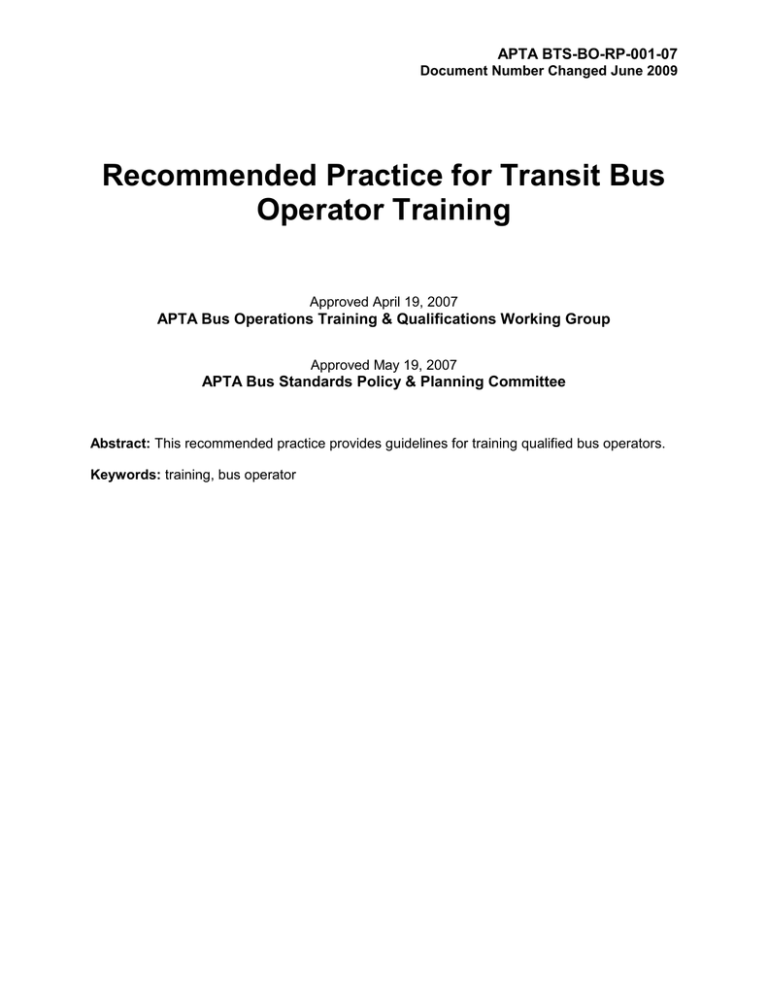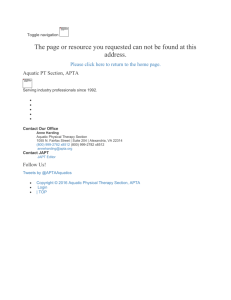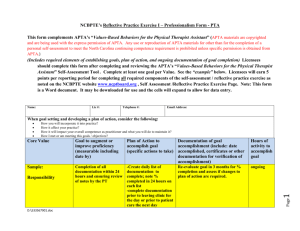
APTA BTS-BO-RP-001-07
Document Number Changed June 2009
Recommended Practice for Transit Bus
Operator Training
Approved April 19, 2007
APTA Bus Operations Training & Qualifications Working Group
Approved May 19, 2007
APTA Bus Standards Policy & Planning Committee
Abstract: This recommended practice provides guidelines for training qualified bus operators.
Keywords: training, bus operator
APTA BTS-BO-RP-001-07
Document Number Changed June 2009
Introduction
(This introduction is not a part of APTA BT-RP-001-07, Recommended Practice for Transit Bus Operator Training)
This Recommended Practice for the Training & Qualification for Bus Operators reflects the
consensus of the APTA Bus Standards Program members on the items, methods, and procedures
that have provided the best performance record based on the experiences of those present and
participating in meetings of the Program Task Forces and Working Groups. Recommended
practices are voluntary, industry-developed, and consensus-based practices that assist transit
agencies, transit providers, and training suppliers in the content and best delivery of bus operator
training and qualifications. Recommended practices are non-exclusive and voluntary; they are
intended to neither endorse nor discourage the use of any product or procedure. APTA recognizes
that for certain applications, the practices, as implemented by operating agencies, may be either
more or less restrictive than those given in this document.
This recommended practice provides guidelines for transit bus operator training and
qualifications. APTA recommends the use of this recommended practice by:
–
Individuals or organizations that operate transit vehicles
–
Individuals or organizations that contract with others to operate transit vehicles
–
Individuals or organizations that influence how transit vehicle operators are trained
–
Individuals or organizations that develop transit vehicle operator training programs
Participants
The American Public Transportation Association (APTA) greatly appreciates the contributions of
the Bus Operator Training and Qualifications Working Group, who drafted Recommended
Practice for Transit Bus Operator Training.
Copyright © 2007 APTA. All rights reserved.
ii
APTA BTS-BO-RP-001-07
Document Number Changed June 2009
Contents
1. Overview ................................................................................................................................................... 1
1.1 Scope .................................................................................................................................................. 1
1.2 Purpose ............................................................................................................................................... 1
2. References................................................................................................................................................. 1
3. Definitions, abbreviations, and acronyms ................................................................................................ 1
3.1 Definitions .......................................................................................................................................... 3
3.2 Abbreviations and acronyms .............................................................................................................. 3
4. GOALS ..................................................................................................................................................... 4
5. Program evaluation criteria ....................................................................................................................... 4
6. Content ...................................................................................................................................................... 4
7. Competencies/minimum qualifications .................................................................................................... 4
8. Regulatory ................................................................................................................................................. 5
8.1 Federal and state regulations .............................................................................................................. 5
9. Agency specific/local ................................................................................................................................ 7
10. Customer service training: ...................................................................................................................... 8
10.1 Role of professional transit operator ................................................................................................ 8
10.2 Customer basics ................................................................................................................................ 8
10.3 Communications ............................................................................................................................... 8
10.4 Difficult situations ............................................................................................................................ 9
10.5 Customers with disabilities .............................................................................................................. 9
11. Technical................................................................................................................................................. 9
11.1 Safe operations ................................................................................................................................. 9
12. Safety and security ................................................................................................................................ 13
12.1 Operator safety ............................................................................................................................... 13
12.2 Customer safety .............................................................................................................................. 14
12.3 Security awareness and emergency procedures ............................................................................. 14
13. Required training documentation ......................................................................................................... 16
14. Recommended best practices ................................................................................................................ 16
Annex A Recommended commercial driving courses ................................................................................ 17
Annex B Additional Resources Websites ................................................................................................... 17
Copyright © 2007 APTA. All rights reserved.
iii
APTA BTS-BO-RP-001-07
Document Number Changed June 2009
Recommended Practice for Transit Bus Operator
Training
1. Overview
This recommended practice provides guidance for standardized transit operator training to assist
in the development of professional bus operators resulting in quality service. Individual operating
agencies can modify these guidelines to accommodate their specific training goals and operating
modes.
1.1 Scope
This recommended practice covers guidelines for setting minimum standards in training of transit
bus operators.
1.2 Purpose
The purpose of this recommended practice is to provide guidance to operating agencies in bus
operator training.
1) Provide a process to create a qualified operator training program
2) Produce a Safe/Professional/Qualified Operator
The areas of importance are regulatory, agency specific requirements, customer service, technical
competencies and safety.
2. References
This recommended practice should be used in conjunction with the following publications:
3. Definitions, abbreviations, and acronyms
For the purposes of this recommended practice, the following terms, definitions, abbreviations,
and acronyms apply.
3.1 Definitions
3.1.1 Operator: a qualified person operating a transit vehicle in transit service.
3.1.2 Bus: a vehicle inclusive of all sizes and types providing public transportation.
3.1.3 Transit: service inclusive of paratransit and transit bus operations.
Copyright © 2007 APTA. All rights reserved.
2
APTA BTS-BO-RP-001-07
Document Number Changed June 2009
3.2 Abbreviations and acronyms
ADA
APTA
CDL
CNG
DOT
EAP
EEOC
FLSA
FMLA
FTA
HOV
LNG
LPG
NSC
NTD
NTI
OSHA
TSA
TSI
UAP
Americans with Disabilities Act
American Public Transportation Association
Commercial Driver License
Compressed Natural Gas
Department of Transportation
Employee Assistance Program
Equal Employment Opportunity Commission
Fair Labor Standards Act
Family Medical Leave Act
Federal Transit Administration
High Occupancy Vehicle
Liquid Natural Gas
Liquid Petroleum Gas/Propane
National Safety Council
National Transit Database
National Transit Institute
Occupational Safety and Health Act
Transportation Security Administration
Transportation Safety Institute
Unions Assistance Program
Copyright © 2007 APTA. All rights reserved.
3
APTA BTS-BO-RP-001-07
Document Number Changed June 2009
4. GOALS
The goals of this document are to:
1) Assist in creating an effective and efficient standardized training program
2) Provide recommendations on content, industry standards and best practices
3) Provide a tool to evaluate existing training programs
5. Program evaluation criteria
Each program needs to be evaluated on the individual needs of the agency while adhering to the
industry standards that every program should be evaluated on:
Legal and regulatory requirements
Industry standards and best practices
Effective and efficient return on investment
Community requirements/standards
6. Content
A training program should include the following topics to develop a safe, professional, and
qualified operator.
-
Regulatory: federal, state and local regulations that impact transit operations.
-
Agency Specific: local agency requirements that impact transit training.
-
Customer Service: meeting the needs of the public and customers.
-
Technical: operator skills needed to safely operate a transit vehicle.
-
Safety and Security: includes all elements related to safety and security for the operator
and the public.
7. Competencies/minimum qualifications
Transit operators trained utilizing the elements in this standard should develop the following
competencies.
Technical skills
Equipment familiarization
Vehicle maneuvering and equipment operation
Pre-trip/post-trip inspections
Copyright © 2007 APTA. All rights reserved.
4
APTA BTS-BO-RP-001-07
Document Number Changed June 2009
Scheduling
Route training
Licensing
Endorsements
Safety and security
Safe vehicle operation
Defensive driving
Hazard recognition
Emergency procedures
Customer service
Communication skills
ADA/sensitivity training
Customer/community relations
Policies & procedures
Fare policies
Documentation
Reporting for duty
Physical fitness
Appearance
Code of conduct
Employee/operator handbook
8. Regulatory
8.1 Federal and state regulations
8.1.1 Federal Regulations
Drug/Alcohol – FTA – 49 CFR, Part 655
Testing
Awareness
Compliance
Administration
Copyright © 2007 APTA. All rights reserved.
5
APTA BTS-BO-RP-001-07
Document Number Changed June 2009
CDL
Federal mandate
Train to obtain permit & maintain CDL
Medical requirements
OSHA
Hazard communication
Blood borne pathogens
ADA
Compliance & responsibility
Stop/route announcement procedures
Boarding/alighting & securement
Signage (communication)
Engineering & design
FLSA
Wages and hours
FMLA
Complinace and responsibility
EEOC
Sexual harassment
Discrimination
NTD
Required passenger counting
8.1.2 State regulation
Below are listed some examples of state regulated practices that may or may not apply to
individual transit agencies. Please contact your appropriate state agency for additional
information.
DOT CDL
Hours of service/work
State Mandated OSHA training/requirements
Periodic training hours
Re-certification
Periodic review
Periodic defensive driving
Periodic onboard observation
Periodic state equipment inspections
Periodic training audits
FMLA
Medical requirements
Copyright © 2007 APTA. All rights reserved.
6
APTA BTS-BO-RP-001-07
Document Number Changed June 2009
9. Agency specific/local
Below are listed some examples of local practices that may or may not apply to individual transit
agencies. Please contact your appropriate local agency for additional information.
Labor contracts policies and procedures
City/county ordinances
Agency policies and procedures:
Organization
Strategic plan
History
Payroll
Benefits
Return to work/light duty programs
Mentor program
Alternate languages
Performance standards
EAP/UAP
System safety program plan
Hazard identification and resolution process.
Violence in the work place
Employee work rules
Disciplinary policies
Employee code of conduct
Periodic re-enforcement (ride checks, road observations)
Required safety meetings
Periodic training
Re-certification program
Periodic review of operator‟s performance
Periodic defensive driving program
On going skills training/behind the wheel/minimum standard of road
observations.
Scheduled outside agency training: TSI, NTI and other training programs.
Documentation and reporting
Security awareness
Emergency procedures
Policies and procedures related to customers with special needs (i.e. all
wheelchair positions are full)
Local partnerships (i.e. Safe Place)
Policies related to children (i.e. strollers, minimum age for riding alone)
New hire orientation
Drug awareness
Copyright © 2007 APTA. All rights reserved.
7
APTA BTS-BO-RP-001-07
Document Number Changed June 2009
10. Customer service training:
10.1 Role of professional transit operator
1. Understanding the role of mass transit in meeting the individual customer needs.
Transit dependent
Discretionary rider
Modal choices
2. Come to work ready to work
Attitude
Appearance
Fitness for duty
10.2 Customer basics
1. Who is the customer?
Riders and non-riders
Internal and external
Customers as voters
2. Customer service policy/performance expectations
3. Who are the riders?
Different levels of abilities
Cognitive
Physical
Socio-economic status
Local or visitor
Age
Cultural issues/diversity
4. Customer behavior (acceptable vs. un-acceptable)
5. Customer feedback process
10.3 Communications
Attitude matters
Operator sets the tone
Be courteous and patient
You have a choice
Active listening skills
Body language
Tone of voice
Make eye contact
Treat all people with respect, dignity and empathy.
Communicating with people with special needs
Copyright © 2007 APTA. All rights reserved.
8
APTA BTS-BO-RP-001-07
Document Number Changed June 2009
Alternate communications/Passenger Assistance Cards
Cultural/Language Awareness
10.4 Difficult situations
1) Conflict resolution
2) Understanding emotional/personal „hot buttons‟
3) Common triggers:
Fare collection
Food or drink
Intoxicated/under the influence
Stop requests
Securement
Customer to customer conflicts
Lost passengers
Bus off route
Inflammatory language
Pass-up/flagging
Service interruptions
Priority seating
10.5 Customers with disabilities
1)
2)
3)
4)
5)
Understand disability from first person experience
Importance of using kneeler and wheel chair lift/ramp
Customer assistance
Language sensitivity (politically correct)
Communicating with people with disabilities
ex. ADA announcements
11. Technical
11.1 Safe operations
11.1.1 Vehicle familiarization
1)
2)
3)
4)
5)
Differences, interior and exterior, between a bus and a car
Variety of equipment
Operator‟s compartment – instruments and layout (includes farebox)
Passenger area
Safety & security technology
11.1.2 Energy sources
1) Different fuels
Diesel
CNG/LNG -compressed natural gas/liquefied natural gas
Copyright © 2007 APTA. All rights reserved.
9
APTA BTS-BO-RP-001-07
Document Number Changed June 2009
Electric (battery, hybrid, overhead wires)
Gasoline
Hybrids
LPG - Liquefied petroleum gas/propane
Other alternate propulsion systems
2) Fueling
Process and procedures
Hazards
11.1.3 Vehicle inspections
1) Pre-trip inspection (according to CDL Requirement)
2)
Inspection methods and checklists
Security checklist/emergency equipment
Documentation/pre trip/defect
Brake testing
Air brake systems check
Air leakage brake test
Low air pressure warnings
Spring brake test
Air compressor build-up test
Parking brakes
Service brakes
Hydraulic brake system check
Check parking brake
Visual inspection for leaks
Service brake check
3) Post-Trip inspection/checklists
Security checklist
Documentation/defect
11.1.4 Bus operating skills
1) Seat positioning/adjustment and seat belt
Mirrors
Rocking and leaning to improve visibility
Adjustments
Coverage
Usage
Copyright © 2007 APTA. All rights reserved.
10
APTA BTS-BO-RP-001-07
Document Number Changed June 2009
2)
3)
4)
5)
6)
7)
Steering wheel adjustment
Vehicle start-up procedures
Shifting
Idling
Accelerating
Steering/maneuvering
Proper hand placement
Turning
Merging
Backing vehicle
Clearances
Curbside clearances
Roadside clearances
Height clearances
Following distances
8) Signaling
Directional
4-Way
Yield indicators
9) Braking
Air Brake/hydraulic brake performance
Stopping distance
Retarder
11.1.5 In-service operations
1) Routine procedures
Fare structure: fares, passes, tickets and transfers
Scheduling
Destination information equipment
Radio procedures and usage
Mobile data terminal
Security alarms
Communication protocol
Climate control
2) Service stops
Unobstructed service stops
Flag/requested stops
Nearside service stops
Farside service stops
Obstructed service stops
Boarding and alighting
Door operation/control
Copyright © 2007 APTA. All rights reserved.
11
APTA BTS-BO-RP-001-07
Document Number Changed June 2009
Kneeling the bus
Lifts/ramp considerations at the stop
Level ground
Obstructions
Curb distance/height
Securement procedures and equipment
Bike rack considerations/procedures
3) Transit facility procedures
Revenue
Non revenue
11.1.6 Special driving conditions
1) Road grade crossings
2) Railroad crossings
3) Expressway/freeway driving
4) HOV/Dedicated lane/Peak hour operation
5) Cue jumping/signal preemption/priority
6) Night driving/glare
7) Pedestrians and cyclists
8) Narrow streets
9) Construction/maintenance crews
10) Detours/route changes
11) Rural driving
12) City driving
13) Incline/decline
14) Bridges/draw bridges/tunnels
15) Electric trolley wires/overhead hazards
16) Signal malfunctions/power outages
17) Seasonal adjustments (back-to-school, day light savings time)
11.1.7 Driving in adverse weather (environmental challenges)
1) Rain/thunderstorms
2) Fog
3) Snow/ice
Copyright © 2007 APTA. All rights reserved.
12
APTA BTS-BO-RP-001-07
Document Number Changed June 2009
4) Hail
5) Flash floods
6) Tornados/high winds
7) Seasonal hazards (leaves/dust)
8) Other natural occurrences
11.1.8 Route training
1) Mentoring/cadet training
2) Landmarks/points of interest
3) Hazard identification
4) Route maps/documentation
5) Time/transfer/layover/recovery/relief points/comfort stops
12. Safety and security
12.1 Operator safety
12.1.1 On the road
1) Defensive driving
Collision prevention
2) Road rage
12.1.2 On the transit vehicle
1) Injury prevention
Repetitive motion
cumulative trauma
2) Assault Prevention
12.1.3 At the facilities
1) Identification of yard and shop hazards
2) Movement of vehicle in the yard
3) Parking instructions
4) Confined area movements
Shop
Copyright © 2007 APTA. All rights reserved.
13
APTA BTS-BO-RP-001-07
Document Number Changed June 2009
Wash bay
Lift areas
Fueling facility
12.1.4 Wellness/quality of life
1) Fatigue awareness/fatigue issues
2) Ergonomics
3) Health & wellness
4) Physical activity
5) Stress management
6) Medical management
7) Home safety/24-7 safety
12.2 Customer safety
1) Customer responsibility
2) Customer safety education
3) Boarding & alighting
4) Customer accidents
12.3 Security awareness and emergency procedures
12.3.1 Operator emergency procedures
Community/operator preparedness (emotional preparedness)
12.3.2 Basic vehicle emergency procedures
Emergency equipment
o
o
o
o
Fire suppression/fire extinguishers
Flares and triangles
Wheel chock/stop
Emergency shut-offs if applicable
12.3.3 Vehicle evacuations
When, where and how
Special situation considerations (fire, bomb, collision)
Customer considerations/special needs
Copyright © 2007 APTA. All rights reserved.
14
APTA BTS-BO-RP-001-07
Document Number Changed June 2009
12.3.4 Vehicle fires
Types of fire identification
Use of fire extinguisher
Systems shut off
12.3.5 Mechanical emergencies
1) Fuels & fluid leaks and containment
2) Brake, steering, & acceleration failure
3) Warning devices
4) Stalled vehicle
Roadway/highway
Railroad crossing
5) Tire failure
12.3.6 Medical emergencies
1) Identification
2) Procedures
3) Blood borne pathogens issues
12.3.7 Incident emergencies
1) Roll-overs
2) Collisions
3) Pedestrians/cyclists
4) On board incidents
5) Boarding and alighting
6) Injuries
12.3.8 Security emergencies
1) Bombs and weapons of mass destruction
2) Hijacking
3) Suspicious behavior/packages
4) Threats and assaults
5) Other weapons (guns/knives/mace)
Copyright © 2007 APTA. All rights reserved.
15
APTA BTS-BO-RP-001-07
Document Number Changed June 2009
12.3.9 Incident investigation and documentation
1) Liability exposure/agency risk
2) Causal factors
3) Preventability and non-preventability
4) Incident/accident report
Current, complete and accurate
Witness/courtesy cards
5) On the job injury reports
13. Required training documentation
All training elements should be documented.
Hours and elements of training
class room
behind the wheel
equipment
Drug and alcohol
Security
Harassment
ADA
CDL
Medical information
Accident/incident
Record retention
FMLA
OSHA
Workers comp
ADA
Test results
Training summary with trainer/operator sign-off
Policy and procedure sign-off
14. Recommended best practices
Agency wide safety committee structure involving someone from every
department
Bus operators safety committees/unions
On going safety inspections
o On board observations
o Facility inspections
o Road observation
Copyright © 2007 APTA. All rights reserved.
16
APTA BTS-BO-RP-001-07
Document Number Changed June 2009
o Probationary on board observations
Periodic check of driver‟s license
Medical requirements
Accident review board:
o management
o labor
Systems safety program plan
Standardized training documents
Periodic retraining
Targeted retraining
o performance monitoring
Probationary review
o 30, 60, 90 day review
Data Collection
o Computerized accident data reporting systems
Incentive/rewards/safety awards
Daily training assessment
Healthy and wellness programs
Bring in people with disabilities to share experiences/video
Have operators experience first hand a “disability”
Copyright © 2007 APTA. All rights reserved.
17
APTA BTS-BO-RP-001-07
Document Number Changed June 2009
Annex A
Recommended commercial driving courses
1) National Safety Council Defensive Driving Course – Adapted for transit
2) Smith System
Annex B
Additional Resources
1)
2)
3)
4)
5)
Training Resources Catalog for Rural and Specialized Transit Systems, FTA RTAP
National Program, 1994.
49 CFR Part 655 – Prevention of Alcohol Misuse and Prohibited Drug Use in Transit
Operations.
National Occupational Standards Professional Bus Operator, Motor Carrier Passenger
Council of Canada, June 2000.
Transit Safety and Security Prototype Approach, State of Colorado DOT, (CD format),
December 2002.
A Guide to Determine Motor Vehicle Accident Preventability, National Safety Council.
Websites
FTA, http://www.fta.dot.gov
FTA Office of Safety and Security, www.fta.dot.gov and use tab, “Safety and Security”
Washington State Transportation Training Commission, www.wsttc.org (click tab on
RTAP Scholarships)
CTAA – www.ctaa.org/training
RTAP, www.indiana.edu/mrtap
Transportation Safety Institute (TSI) www.tsi.dot.gov
National Transit Institute (NTI), www.ntionline.com
Federal Register, www.access.gpo.gov/nara
National Safety Council (NSC), http://www.nsc.org
Copyright © 2007 APTA. All rights reserved.
1


